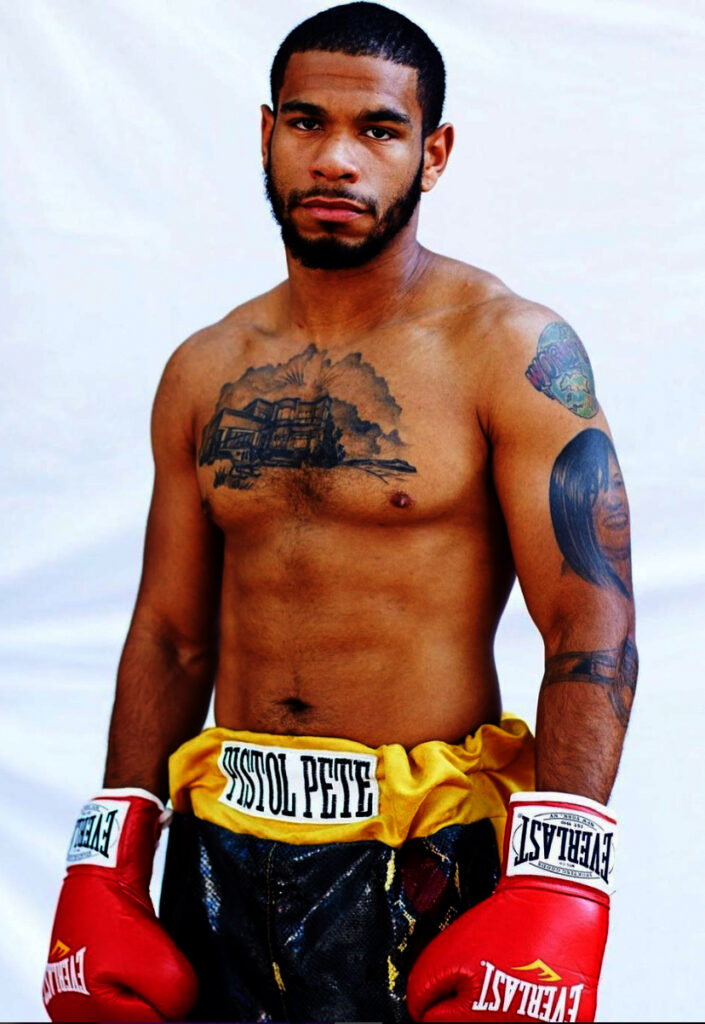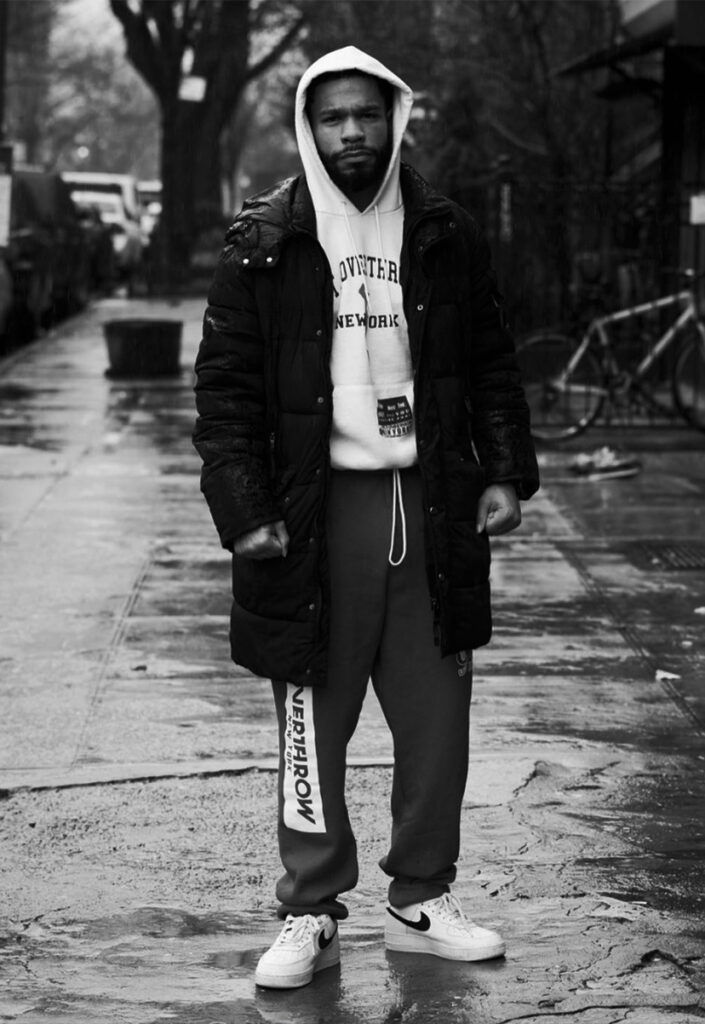Aspiration is sparse amongst the kids hustling in certain neighbourhoods in the Bronx, New York. Chasing money over dreams becomes paramount, and settling for the sounds of the streets can allow lost figures to finally feel at home.
“All the older people I know around me that were successful, they were all drug dealers. That’s all I saw. If you want to get money or you want to get out the hood, the best way to do it is to sell drugs,” states Bronx native and undefeated junior middleweight Pete Dobson (11-0, 7 KOs).
“The drug dealers that I know, they would move out of the hood; they would buy houses in upstate New York and they would actually do positive things with their money. I’m not saying that’s positive, selling drugs, but I looked up to the people who could change their family’s lives and shit like that. They moved them out of bad neighbourhoods, put their kids in better schools and stuff like that. So that’s why I wanted to be a drug dealer, because I wanted to do better for my family.”
Boxing, as a sport, is infamously rife with disruption. The ups and downs of a career between the ropes aren’t new to Dobson, despite ongoing struggles with his management currently curtailing his promising professional career.
When speaking to Boxing Social, he’d been out of action for almost 16 months. But the 30-year-old was still sparring regularly with some of the sport’s elite champions, staying fit and hoping to punch his way through some contractual red tape. The sanctuary of the sidewalk is never too far away though, and it’s something that runs in the Dobson family, as the fighter lost his father just a week after he was born.
“He was set up; he got shot. He went to go and get his car, back in the day drug dealers used to drive those jeeps where the roof comes off of it, you know?” Dobson asks, searching for the make and model for a solid 10 seconds. “I forgot the name of it. But he had just got his stereo system done and, when he went to go pick his car up from the place, it was a set up and they shot him five times. I was only seven days old. But from what I hear, it got left in the streets; it got taken care of in the streets.
“I had a strong mom. So she kept me out of the streets, basically. Knowing what the streets did with my father helped me stay out of the streets also. That actually helped me in a positive way, knowing what can happen to you if you make the wrong choices in life. I was just happy I didn’t end up in jail or anything. Because my mom, she used to freakin’ work all day – I didn’t have a father. I basically raised myself. My sister, she’s 10 years older than me, she used to watch me and shit.
“Just your regular urban childhood,” surmises Dobson, sounding unaffected and relaxed on the surface, but almost definitely suffering beneath this rugged facade. Boxing was – as cliché as the narrative’s become – his only opportunity. It was an escape, not from the immediate difficulties and suffering at home, but from his seemingly inevitable career on the streets of the Bronx.
“When I was an amateur, I really never took boxing seriously, probably until I turned 23. That’s when I won the Golden Gloves in New York. I was working long shifts; I used to work overnight. I signed up, not even expecting to win it, because I was working so much. I had lost the year before because I was working a lot then, but this year I was like, ‘Let me just try this shit’. I beat the best kid; I beat one kid that was number one in the country.
“Then, in another tournament, I beat the 165lbs kid from New York, and he was ranked in the top three in the country. I beat both of them in the same year, and that’s when I was working overnight. So that year I quit my job and I was like, ‘I’m going to take boxing serious. Because if I could beat these dudes and I’m working a job, and I’m not even taking this shit serious, imagine if I put 100% in?’”
After turning professional in 2014, Dobson rattled off an exciting six wins in 13 months, with five coming inside the distance. He’s only fought five times since – averaging just a fight per year since October 2015.
Dobson tells Boxing Social: “There’s a boxer, he’s big right now in boxing, he’s a close friend of mine. One day before he became big, he used to stay in my house when he’d come to New York. And one time he’s like, ‘Yo, that’s why your boxing career is not going how it’s supposed to be going, you’re blocking your blessings’.
“Like I was telling you, I always used to have to work and box, work and box. And then there was a point where I was like, ‘Fuck this work and box shit, I’m getting back in the street’. I was making the most money I was ever made. But then I broke my hand, so I couldn’t box for a year because of that injury. I thought, ‘Damn, fucking right when I started getting money, and I feel like I could have paid for strength and conditioning, now when I could focus 100% on boxing, I get injured’.
“I had my cast on and shit [and my friend] he’s like, ‘Stop doing this shit’. So, then I was really like, I’m just going to give boxing 100% the right way, and I’ll struggle if I have to, and see where it takes me. But still… I still have these fucking roadblocks, you know what I mean?”

Photo: Neil Gavin.
Frustration was the overriding emotion carried through Dobson’s voice. He’d dipped in-and-out of various types of employment, some legitimate, some maybe less so, but now in his physical prime he wants to make his mark as a fighter for his son’s sake.
Thankfully, his contractual dispute looks to be approaching its conclusion, which should see the unbeaten Bronx prospect free to box on any platform he chooses.
Sparring fighters like Jaron Ennis, Erickson Lubin and, most recently, P4P star Terence Crawford has only served as reassurance – he is talented enough for world titles. But whether he’s cleared the final hurdle remains to be seen.
A short stint living in Las Vegas, and basing himself out of the Mayweather Gym, gave Dobson a glimpse of the big city lights – though he decided swiftly to return east. He’s fought on plenty of bills in New York, even appearing in Louisville and Orlando, but his last victory was in Vegas. He impressively stopped fellow unbeaten fighter Emmanuel Medina (WTKO5) at the MGM Grand in July 2019.
Dobson’s next fight remains a mystery. But I wondered how many boxers had found themselves in a similar situation; handcuffed to bits of paper, running out of energy and losing faith in the sport. He has overcome so much personally, constantly displaying grit, and is now trying to use his initiative within the confines of the law.
Sadly, boxing is borderless, and he continues waiting for the decision regarding his freedom as a fighter and his management. What comes next?
“I’m good with money. So, I’m thinking about the future; I’m thinking about making a lot of money in boxing, and investing that money,” he says. “That’s really what I’m looking to do. Maybe I’ll open up some gyms, you know? I’m working at a gym right now and I’m training other people, it’s a good idea. I think I could make a lot of money from one of those types of gyms.
“Some of these other fighters, they’re going to go through the same problems that I’m going through. Just because these managers, basically they’re like, ‘You have no leverage’. No matter who you are, if you’re coming out of the amateurs, they’re like, ‘If you want to sign this contract with me, we’re going to make you a star. Even though this contract is not a good contract, we’re going to make you a star. And if you don’t want to sign it, we’ll just make somebody else a star’. That’s the way boxing is now, man; the boxing business is fucked up.”
At times, it’s hard to argue.

Photo: Neil Gavin.
Main image and all photos: Neil Gavin.